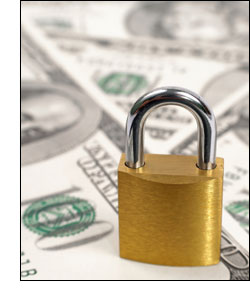 Just because your wallet is sitting in your pocket or purse, doesn’t mean your money is safe. Whereas the thieves of the past may have physically stolen your cash or valuable possessions, today’s thieves often use a variety a sophisticated techniques to part you from your money. Being aware of what scams are out there can help you protect your hard-earned cash.
Just because your wallet is sitting in your pocket or purse, doesn’t mean your money is safe. Whereas the thieves of the past may have physically stolen your cash or valuable possessions, today’s thieves often use a variety a sophisticated techniques to part you from your money. Being aware of what scams are out there can help you protect your hard-earned cash.
Fake Checks
There are a few variations of this scam. If you advertise something for sale, you may get an e-mail from an interested seller who says he does not live nearby and will send a check. When the check arrives, it is for more than the sales price. The buyer makes an excuse and asks you to wire back the difference. Or you may receive a letter stating you won a foreign lottery, and to claim the prize, you should deposit the enclosed check and wire back the money to cover taxes and fees. The check looks real, and you should not have a problem depositing it with a teller or ATM. However, once the financial institution processes it (which could take a few days), they find out it is fake. You likely won’t be able to get back the money you wired, and if you have already withdrawn some of the funds from your account, you will have to pay it back. You can avoid this scam by never wiring money to a stranger and requiring buyers to pay you in cash.
Free Trials
Free trial offers abound on the internet for a variety of products and services. However, these free trials are rarely free. You usually are required to provide your credit card information when you sign up, and in tiny print there is a disclaimer stating that you are signing up for a membership or auto-ship program, and your card will be charged on a regular basis if you do not cancel it. Many consumers don’t know this until the card is charged, and when they call to cancel, they often find it nearly impossible to get in touch with a customer service representative from the company. If you have to provide your credit card information, just don’t do it.
Financial Rescue Companies
There are many organizations that prey on consumers facing financial distress, the most common ones being foreclosure rescue firms, credit repair agencies, and debt settlement agencies. Many just take your money and run. Even if they do what they say they will do, often they charge you a hefty fee for something you can do yourself for free (such as call your lender or dispute inaccurate information on your credit report). That does not mean that all companies that provide financial guidance are a scam. How can you tell the difference? A legitimate credit counseling agency won’t charge a fee for basic counseling and education (although they may charge a low-cost fee for other services). They also won’t put pressure on you to make decisions right away.
If you believe that you have already been the victim of a scam, you can report it to the Federal Trade Commission at 1-877-FTC-HELP and your state’s attorney general’s office.


